Meet our heroes
Learn about the visionaries, musical giants, and people who have given their hearts and hands to advance the art and life of barbershop harmony.
jump to: Hall of Fame • Arrangers • Joe Liles Award • Labar Emcee Award • Celebrities • BHS Presidents • Co-Founder O.C. Cash • Honorary Life Members
Co-Founder Owen Clifton "O.C." Cash


"Our Founder: The Apostle of Harmony"
By Deac Martin, as featured in The Harmonizer, September 1953
"A man who symbolized an important phase of an era is gone. The era was the 1890s and 1900s into the first World War; the phase was informal harmony singing of popular music. That music is important today because it reveals musical customs of an earlier era while its lyrics carry much of the thought and many events of those more tranquil days. Also by that time informal harmony singing had evolved into a distinct American pattern that was basically the same wherever four or more men able or willing to carry four parts got together..."
Read More
Owen Clifton Cash was molded by those times and by the life in the small towns in the Southwest where he spent his most impressionable years. Longing to restore the popular songs and singing customs of his youth and early manhood, songs and customs which were nearing the vanishing point in 1938, that year he headed a local movement in Tulsa to attempt to revive them. Within ten years he saw the results of that localized intent impressed indelibly across great cities as well as small towns of two nations in a different atomic age. The singing patterns were preserved along with the songs.
The Harmonizer of December, 1943 was dedicated to O. C. Cash by a foreword which said in part:
“Only rarely does America produce a son with the ability to open the nation’s eyes to what it has been missing in simple and wholesome pleasure that is easily attainable. Less often does such a one have the generosity to share his vision beyond his immediate environs; the conviction, courage, and tact to win others to his thinking; and the patience backed by driving force to attain an objective which holds no pot o’ gold reward . . . Cash has done more than spread wholesome enjoyment to the early 1940s; he has furnished the means to preserve a period rich in American traditions . . . It is conceivable that his Society may in the future be the connecting link between whatever generation is current, the one preceding it, and the one to follow, as oldsters and youngsters group in harmony”.
Fifteen years and an International status, as compared with the ambitious “national” hopes in 1943, have brought thousands of members into the Society to whom Cash is merely an honored name. Widespread retelling of the events leading to the formation of SPEBSQSA and its early struggles inevitably results in misinformation and some inaccuracies. The Society is fortunate that the march of events of those days is recorded in “Keep America Singing”, the book which covers highlights of the first 10 years, and that every word was approved by Owen Cash with a brief “That’s how it was” notation.
Past President Hal Staab (also deceased) led the drive to get those early years of the Society down on paper as the participants had lived them.
The Man

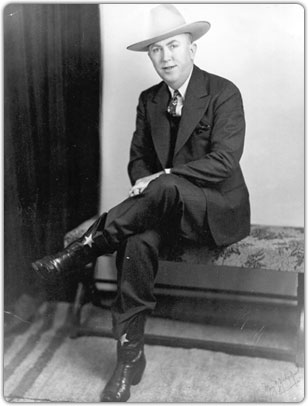
The book of the Society’s ten years does not include biographical facts about the founder, therefore, it is well to set down salient ones concerning the man and his early environment as well as some of his interests apart from the now famous harmony avocation.
When Owen was about age six his Baptist-minister father took the family from northern Missouri, where the boy had been born February 13, 1892, near the tiny hamlet of Keytesville in Chariton County, on a wagon trek over the dirt roads and trails to the Southwest. After a trip comparable with crossing Africa by motor car today they arrived in Catale in the Coo-Wee-Scoo-Wee District, Cherokee Nation, Indian Territory, to become a part of Oklahoma later. They set up housekeeping in a log house rented from an old Cherokee. Subsequently they lived in Vinita and in Blue Jacket where young Cash played in the Silver Cornet Band and began to get the feeling of baritone harmony. He graduated from Bacone College, Bacone, Okla. and was admitted to the Bar in that state in June, 1916. Next year he enrolled in the U. S. Army but was still waiting to go overseas when the First World War ended in 1919. Two years later he joined a subsidiary of the Standard Oil Company of Indiana as assistant tax commissioner, and in 1930 became tax commissioner of Stanolind, a Standard Oil pipe line subsidiary.
His profession as a tax lawyer led naturally into activities in the National Tax Association, the Oil Industries Information Committee, and the Mid-Continent Oil and Gas Association, while his public service duties included work in the Tulsa Chamber of Commerce and the Oklahoma Public Expenditures Council. More personally his affiliations included the Presbyterian Church, the Sons of the American Revolution, and the Tulsa Farm Club. The Cash ranch near Talala, Okla. is today a well run producing farm property. The owner’s weekend home is replete with mementos, photographs, sketches, and souvenirs of 15 years in SPEBSQSA.
The background, the activities, and accomplishments just outlined give a picture of a man who attained much comfort and strength through his sense of material order, intellectual order, and moral order. He was a prudent man.
His wife Corinne, his daughter Betty Anne (Mrs. Eugene A. Oathout), and his sister, Miss Idress Cash who took the long rough trail with small Owen to the Cherokee Nation so long ago are justifiably proud of the one who earned the title of Good Citizen before the outside world knew him as the “Apostle of Harmony”.
Owen Cash’s prudence was something that friends and associates took for granted. In consequence in countless places he will be remembered more for his humanness and his sense of humor. At its finest that Cash humor is preserved in the name of our Society and in the title with which he endowed himself. The invitation to the original meeting at the Tulsa Club, April 11, 1938, was signed by Rupert I. Hall, “Royal Keeper of the Minor Keys” and by O. C. Cash, “Third Assistant Temporary Vice Chairman” of “The Society for Preservation and Propagation of Barber Shop Quartet Singing in the United States”. Shortly after, Propagation was changed to Encouragement and he took in all of America. Still later he headed his own title with “Founder and Permanent . . .”. The combination of the grandiose applied to such a hobby and the obvious tongue-in-cheek dig at the spreading alphabetical agencies of the New Deal smacks of Mark Twain with overtones of Will Rogers, all three of them sons of the mid-states.
During the Society’s first year he announced intentions to petition WPA (an emergency agency) for $9,999,999.99 to survey the male vocal range, nationwide. Before the first Convention-Contest in Tulsa, June 1939, he solemnly informed news reporters that Herbert Hoover, Alfred Landon, “Al” Smith, and James Farley, top names in the news of the day, would be “invited to Tulsa” to sing in a quartet.
At New Year, 1942, many Society members received a certificate from Cash raising them to the status of “Ex-Okies” since they had “harmonized successfully . . . with the famous Okie Four—World’s foremost exponents of barbershop harmony” with which quartet he sang an enthusiastic baritone.
His humor was gentle, frequently keyed to some element of self-depreciation, hardly every conceived in terms which might embarrass anyone or make the butt of the humor uncomfortable. These excerpts from The Founder’s Column in the Harmonizer are typical: After the Grand Rapids Convention-Contest, 1942, the Column carried the complaint that the judges were “deef”. “The Okies sang in the first preliminary and from all unbiased reports went over big with the audience, but just to show you how incompetent and prejudiced the judges were, one of them came rushing over and said the Okies have the honor of being the first quartet eliminated. I can’t understand it, until I found out one was a lantern maker (past pres. Embury). The continual hammering and picking away on them tin lanterns has made him deef as a board. Then there was Reagan who was an electrician by trade (Maurice Reagan is a great authority on electronics).”
Writing of a get-together in Detroit, “Huck Sinclair and me was setting around, listening to all them sweet chords and wiping our eyes and Huck said between sniffles ‘Cash, I never knowed I had so many friends or could sing so good'”.
He wrote to an out-of-town banker who had inquired about membership in the Society, “There is nothing that so quickly and effectively restores the respectability of a banker as joining up with SPEBSQSA. Because of the warm hearts and generous souls of our club the rules have been amended to allow bankers to join . . .”
In 1945 commenting upon the Sweet Adeline organization Cash said in part: “It is a shame this had to come up just when we were getting along so peacefully. I am bewildered, confused, and all messed up besides . . . hoping you are the same”.
Some of his early columns were treasures of Americana. The May 1945 Harmonizer narrates in detail how they left Missouri and landed in the Cherokee Nation, the need for schooling for the children and how his preacher-father picked out a tramp who had been kicked off a Frisco freight train and got him to teach school (where he did a perfect job of moral as well as formal education of the little pupils) until the U. S. Marshal walked into the school house one day, “Pearl handled six shooters dangling from his wide cartridge belt” and took the teacher away to finish his penitentiary sentence back East. It is Cash narration at its best, bright-hued with local coloring and brimming over with smiles.
Deac Martin
The Harmonizer, September, 1953
Owen Cash and the Society in 1953
What was Cash’s attitude toward the way the Society was handled after he turned the reins over to succeeding Boards and administrators, and based upon the actions of those administrators, what did he think of the organization’s future?
He followed with keen interest the many intricate phases of expansion throughout Canada as well as the States. In general he had nothing but praise for the administration of the international organization, the districts, and the chapters, though in the late ’40s he expressed some concern over the possibility that the influx of younger members, reared in a different school of harmony (“and life”), might “wean the Society away from barbershop”, particularly because of the intense competition in contests “where they’ve got to throw the book at the judges”.
He said: “It that were ever to occur, the Society might not last long because it would dump overboard the very thing that made it”, and has kept it unique and apart from other singing organizations, meaning its distinctive style of harmony with an appeal to all sorts, degrees, and ages of music appreciation.
But in 1953 he said he had ceased to worry “too much” on that point which would reduce SPEBSQSA to the level of comparison with other musical groups, professional and amateur. “We’ve got some good heads; they won’t let the Society drop what we stand for”. He listened to the plans of the Committee on Long Range Planning as expressed at the first meeting of the House of Delegates in Detroit, June, 1953, when Dean Snyder, Committee chairman, said to the House in part: “‘The old order passeth, giving way to the new’ . . . It is evidence both of our vigor and our maturity that we could make this significant change so smoothly . . .” He cited the many activities now possible to give outlets for the energy and interests of every member, including opportunities for craftsmanship in the technically musical phases of barbershop harmony. In closing he quoted Alfred Noyes: “‘If I looked farther ahead, it was because I stood on giant shoulders’. Here in the presence of our founder, our past presidents, and other ‘statesmen’ of our Society, these words have special significance”.
Afterward, when asked what he thought of the plans for the future, the founder said: “They’re sound; we’ll keep on having good leaders”; this from one who in earlier years had felt, with many other seniors, that note singing was beneath the contempt of a “true barbershopper”, but who now endorsed the technicalities of music as one of the things helpful to the Society’s advancement thus far, and necessary for the future.
The person who symbolized an important phase of an era is gone. But for his particular fitness to be the nucleus in the Society’s tentative stage of development, that phase of the 1890s and 1900s might not have been projected into this age to give untold pleasure to participants and those who love to hear harmony. Fifteen years of the Society constitute a proving period of sufficient time under varied conditions in urban and rural areas to demonstrate that popular songs sung in the traditional barbershop pattern are still important in the atomic age.
The person who was the symbol of the preservation and encouragement of such singing had faith that its traditions will be passed along by a generation twice removed from his own, though just as actively interested and even more proficient within this Society. “They won’t let the Society drop what we stand for” he said.
Deac Martin
The Harmonizer, September, 1953
Society Hall of Fame
The Barbershop Harmony Society Hall of Fame was established by action of the Society Board of Directors as a means of bestowing Society recognition and honor to members and quartets — living or dead — for exceptional contributions made that have enhanced the life blood of the barbershop experience for the Society.
Honoree Selection Process
Honorees are selected by a majority vote of the committee, and there is no maximum or minimum limit on the number of inductees in a given year.
The award criteria used by the committee fall into general categories of music and administration/leadership. In music, judging, arranging, composing, chorus directing, coaching and singing are important. In administration/leadership, service as an officer, advisor, and in planning, writing or editing are considered.
Learn more about the Hall of Fame committee and selection process.
Hall of Fame Members
2025: Mark Hale
Mark Hale

Mark has distinguished himself in numerous ways, beginning with his directorship of Louisville Times, a chorus noted for its unique and original musical and visual style, giving inspiration to other small choruses. He later directed the Masters of Harmony to four International Championships and Sound of the Rockies to two medalist placements. As lead of the 2001 Quartet Champions, Michigan Jake, he and the quartet were widely emulated for their effective treatment of tempo and rhythm. Mark is an accomplished arranger, especially of charts that are quite accessible to groups at all levels while being interesting and innovative, such as You Make Me Feel So Young, My Ideal, and Always (with Don Gray). He was the primary coach of OC Times, 2008 Quartet Champions, and is a sought after coach for top groups worldwide. He has served for many years as a judge in the Musicality (formerly Music) Category. Mark is widely known, respected, and admired by barbershoppers around the world.
2024: Steve Armstrong, Aaron Dale, Tom Gentry, Clay Hine

Steve Armstrong
The BHS honors Steve Armstrong for his exemplary service as a director, arranger, teacher, performer, and leader. Few barbershoppers can understand the depth of impact Steve’s service has had on the Society and his servant’s quiet attitude are some of the reasons his leadership is so powerful.Steve has been a Barbershop since 1976 and a frontline director for most of this time. He founded the Toronto Northern Lights Chorus and served as its director or co-director from its inception, winning numerous medals and ultimately the International Championship in 2013. Many choruses emulated TNL, as they showed that a small chorus could achieve top honors and provide visionary and ground-breaking performances from the dramatic to the hilarious. He arranged much of the Northern Lights’ music, and his musicianship and vision was ever-present in their delivery.
Steve also has previously directed the East York Barbershoppers and Scarborough Dukes of Harmony at the International level. In 2019 he was awarded the Joe Liles Lifetime Achievement Award for excellence in directing leadership.
Steve was certified as an Arrangement Judge in 1987 and has served continuously as a Music (now Musicality) judge since the category inception. He served on a number of Boards of Review and finally as Category Specialist. Since 2020, he has been the Chair of Contest and Judging. Steve’s leadership, patience, and vision was vital in navigating all of the issues the Society faced during the pandemic, coming out even stronger on the other side.
As C&J navigates using new software to more effectively manage contests, Steve’s leadership and vision as well as his technical and analytical skills have been crucial in ensuring the integrity of our contests. Steve’s ingenuity created the ability for competitors to have more options during their contest feedback sessions as well. Steve continues to serve tirelessly on behalf of all of us as he continues to positively shape our contest experience.
Aaron Dale
Rarely in the history of our Barbershop Harmony Society does someone completely alter how we think about the barbershop style. Aaron Dale is one of those few.
Over the past two decades, quartets and choruses at the highest levels across the world have sought out his musical ideas and cleverness. His keen sense of rhythm— coupled with the expertise and flair to musically evoke the same—changed how several genres of music could be expressed in the barbershop style. Today, all barbershoppers sing backbeat and swing better because of Aaron’s ability to weave his creativity into the texture of an arrangement, positively impacting the musicality of all singers performing his arrangements. As a result of his impact and contribution, Aaron received recognition as part of the inaugural class of recipients of the BHS Lifetime Achievement Award for Arrangers in 2020.
Aaron also blazed a new trail for small choruses with his leadership as director of Kentucky Vocal Union, providing some of the most innovative performances ever witnessed in chorus competition.
In addition to teaching and coaching, Aaron also served as a Music judge and as a District Representative for Contest and Judging for the CAR district for a number of years. The Society will feel the impact of Aaron’s contribution for decades.
Tom Gentry
Tom’s two largest contributions to the Society are in the world of arranging and working with other barbershop organizations. Although Tom has arranged music for medalist-level groups, all of his arrangements are accessible to and singable by all levels of singers.
In 2020, he was recognized as part of the inaugural class of recipients of the BHS Lifetime Achievement Award for Arrangers. He has been a long-time mentor to Harmony, Inc, as well as nearly every alliance organization throughout the barbershop world. Nearly every barbershopper in the past 50 years has been directly impacted by Tom.
A member of the BHS since 1969, Tom certified as an Arrangement judge in 1979 and he has the distinction of the most years of service, with 44 years as a certified judge, judging in both the Arrangement and Music (now Musicality) categories. As a judge, he served on Boards of Review and is a past Category Specialist.
Tom was a fixture as a faculty member at Harmony College/University for decades teaching dozens of different classes. He also worked at Harmony Hall as a Music Specialist for seven years. His hard work and favorable relationships with several publishing houses led to arrangers being able to publish more songs in the barbershop style. Last, Tom chaired the Music Publications Committee for many years and is a favorite director, quartet singer, and coach. Tom’s contributions over his lifetime are numerous and significant and the Hall of Fame award is fitting.
Clay Hine
Clay Hine has been a member of the Barbershop Harmony Society since 1978. He has sung baritone in multiple quartets, including the 1999 International Championship Quartet, FRED, and the finalist quartet Category Four and medalist quartet A Mighty Wind.
Clay was one of the driving forces in helping redefine how comedy could be portrayed at the highest levels of both quartet and chorus competition, thus influencing future comedy quartets.
A successful chorus director, Clay has appeared in the BHS International Chorus Contest for over 30 years as a director or co-director with Big Chicken Chorus, Atlanta Vocal Project, and Heralds of Harmony, medaling with Big Chicken and AVP/Heralds.
Clay is the 2023 recipient of the Joe Liles Lifetime Achievement Award for excellence in directing leadership. Clay has been involved in Contest and Judging since the early 1990s as an Arrangement and Music Judge and has served as a member of the Board of Review. Continuing his legacy of serving, he is the incoming Musicality Category Specialist. Clay is also a prolific arranger, having his charts sung by numerous quartets and choruses in all barbershop organizations.
In 2020, Clay received recognition as part of the inaugural class of recipients of the BHS Lifetime Achievement Award for Arrangers. He is a teacher and coach at the highest of levels and his insight is sought out by singers all over the world. Clay’s contributions and impact to BHS at his chapter, district, and international levels are significant and will be felt for generations.
2023: Renee Craig and Vocal Spectrum
RENEE CRAIG*

The Cracker Jills, 1957 quartet champion, Sweet Adelines International
Ramapo Valley Chorus, three-time champion director, Sweet Adelines International
Inaugural recipient, President’s Lifetime Achievement Award, Sweet Adelines International
Influential arranger, teacher, coach
The nomination of Renee Craig for induction into the Barbershop Harmony Society Hall of Fame is unusual in two regards. First, the person was not a member of BHS, in fact, would have been ineligible for membership. Secondly, this person, now deceased, was a woman. Nevertheless, the BHS Hall of Fame Committee recommended Renee Craig on the strength of her lasting impact on the entire barbershop world.
Renee’s primary contributions were made as a member of our friends in harmony Sweet Adelines International. She did make contributions that directly benefited the Society as several of her contest arrangements made their way into our ranks and in fact helped win gold medals, including “May I Never Love Again,” “Ring Out the Bells In Dixieland” (the latter her original composition), and a number of other arrangements were picked up by quartets and choruses, including “Everybody Loves A Lover,” “Country Roads,” “Back in the Old Routine,” “Tumble Down Shack in Athlone,” and “My Love is Like a Red, Red Rose.” Moreover a number of her arrangements were the prototypes of arrangements made by prominent Society arrangers, such as “Lover Come Back,” “What’ll I Do,” I Have Dreamed,” and “Royal Garden Blues.” She also coached men’s ensembles and served as director for the Westchester Chorus in the Society.
However, her contributions within Sweet Adelines were so notable, distinguished, and towering that it influenced the culture of barbershop worldwide and as such her impact bled into all the barbershop organizations, including BHS. She was the lead singer in the landmark quartet Cracker Jills, which was admired and emulated by all barbershoppers at the time.
Her incredible innovation as an arranger, composer, and director was highlighted by her directorship of the Ramapo Valley Chorus and the Coronet Club Chorus (composed of International Quartet Champions in Sweet Adelines, and founded by her), in which her stage personality and charisma was a model of performance. In this way she had a huge impact and influence on many of our arrangers and performers, who emulated her innovative style.
VOCAL SPECTRUM

There are currently 12 quartets in the BHS Hall of Fame, 10 of which are gold medalist champions. As one examines the traits of these 11 gold medalist quartets, all of them had substantial impact after they won.
Vocal Spectrum won the college contest in 2004 with the highest score to date and two years later won the International Gold in 2006. They instantly became in demand as a high profile show quartet and that continues through to 2023.
Because of their youth as well as musical excellence, they have influenced countless young people in introducing them to the barbershop style and our Society, and continue to do so even today.
Tim Waurick, Eric Dalbey, Jonny Moroni and Chris Hallam continue to raise the bar with improving their vocal excellence and challenge all quartets to those high standards. They have made the impossible possible and thus have grown the barbershop artform. Individually, they also give back to the BHS community. Jonny is a gold medalist co-director of the Ambassadors of Harmony and frequent coach. Eric is a coach as well as a BHS Certified Singing Judge. As a learning track producer, Tim forever changed the landscape of how barbershoppers learn music and was inducted into the 2022 BHS Hall of Fame for his significant contributions. All four give back their time to District schools as coaches.
Even though the quartet is still active, they are already one of the most influential quartets in BHS history. The Hall of Fame Committee is proud to endorse Vocal Spectrum for induction into the BHS Hall of Fame.
2022: Joe Connelly, Tony De Rosa, and Tim Waurick

Joe Connelly is a 43-year member of the BHS and has contributed as a singer, coach, judge, and a director. His unmatched achievements as a gold-medal lead (Interstate Rival, Keepsake, Platinum, and Old School) have inspired thousands of leads with his unique, high-energy style, and his many years of judging and tireless top-notch coaching of choruses and quartet at all levels have helped barbershoppers all over the world reach their true potential as artists.

Tony De Rosa is a 40-year member of the BHS, and stands with Joe as the only other barbershopper to have won four gold medals (Keepsake, Platinum, MaxQ, and Main Street.) He’s the youngest ever to win gold at age 19. Tony has directed multiple choruses over his 27 years of directing, and spread the joy of barbershop to literally millions of people through his work as musical director of the Dapper Dans of Disney World.

Tim Waurick is a 28-year member of the BHS and, along with being the tenor of one of the most influential quartets of all time, Vocal Spectrum (2006 champion), he has contributed in the form of singing, coaching, and learning track production that has fundamentally changed how thousands of barbershoppers are able to learn new barbershop music with artistry and precision.
2020: Alan Lamson and Kevin Keller
ALAN LAMSON

The son of a Society member and a Sweet Adeline, Alan Lamson joined the Barbershop Harmony Society in 1981 and immediately began to make a difference in the Manchester, CT chapter.
He served as chapter President, Executive Vice President, and Music VP, and was awarded Barbershopper of the Year in 1989 and 1991, along with Barbershopper of the Decade for the 1990s.
At the district level, Alan has served as the Northeastern District (NED) president in 2003-2004, and has served as the NED VP-Contest & Judging since 2017. He has served on many Society committees, too many to mention here, and was named the Barbershop Harmony Society President in 2011-2012. He assumed the Society Interim Executive Director position in the summer of 2012 as he led the search for the new CEO.
Alan holds Bachelor’s degrees in Building Science and Architecture, as well a Master’s Degree in Public Administration. This would prove very beneficial to the members of BHS, as he took a leadership role in the Headquarters Location Search Committee. Alan identified the new headquarters location in Nashville, and made a significant contribution to the design of the building remodeling project. Alan’s administrative influence at the chapter, district, and society levels has had a lasting impact on thousands of barbershoppers and has helped to shape the future of the Barbershop Harmony Society.
KEVIN KELLER

A society member since 1978, Kevin’s contributions have been in the areas of Arranging, Quartet and Chorus Competition, Coaching, and Contest & Judging. He is a prolific arranger, having arranged over 250 songs that have been performed by quartets and choruses all over the world. He has also served on the BHS Music Publications Committee.
Kevin has won several chorus medals, including multiple gold medals with the Vocal Majority and the Ambassadors of Harmony. Kevin has sung in many quartets as well, winning the Central States District in 1997 with “The EIB Quartet” and placing 6th at the 2003 International Competition with “Cheers!” He is a highly sought-after coach throughout the BHS, SAI, and other international barbershop organizations. He has served on the faculty at numerous district schools and workshops, and has been a fixture on the Harmony University faculty for many years.
Perhaps Kevin’s biggest impact has been in the area of Contest & Judging. He has been a certified Music judge for over 20 years, 18 of which have been spent in leadership roles. He served on the Music Category Board of Review for 7 years, was Music Category Specialist from 2008-2010, spent 4 years as the Chair of the Society Contest & Judging Committee, and 4 more years as the SCJC Past Chair. Kevin has been instrumental in collecting and organizing over 80 years of BHS contest and judging history, and initiated the process for certifying new women judges well before the Society's formal Everyone in Harmony announcement.
2019: Dr. Jim Henry

Jim Henry was born into a barbershop family—both his father, Bob Henry, and mother, Rose Manion, were barbershop singers. He joined the Society in 1975 at the age of 11 as a member of the Daniel Boone Chorus, which later changed its name to the Ambassadors of Harmony. He became the director of the Ambassadors in 1991 and went on to lead the chorus to 15 medals including 4 gold medals.
A 44-year member of the Barbershop Harmony Society, Jim is a two-time BHS International quartet champion bass, and a four-time international chorus champion director.
2018: Dr. Ray Danley and the Easternaires Quartet

Dr. Ray Danley joined the society in 1957. Since then, he has helped write the Society’s first Chorus Director’s Manual in 1973, qualified as a semifinalist in the International Quartet Competition for seven consecutive years, taught as a faculty member at Harmony University from 1958 to 1967, (and loving it so much that he came back in 2001 and stayed until 2015). In 1977, Ray directed the Scarborough Dukes of Harmony, who became the first competitor - either quartet or chorus - from outside of the United States to win gold. Not only that, but Ray has advocated his love of harmony by sharing it with countless others, increasing membership of his local Simcoe Chapter, Gentlemen of Harmony, from 32 in 2001 to 84 in 2015.
Nominator Steven Armstrong, now director of the Toronto Northern Lights and the 2013 International Chorus Champions, sums up Ray’s dedication eloquently, saying, “[Ray] did what he did because he loved making music and loved helping other people experience making music at a higher level. Ray has demonstrated that in addition to his rare feat of being a multiple gold medal winning chorus director, he was a Hall of Fame barbershopper in the ways that he so generously gave of his time to develop the singers, directors and teachers that would follow him."

Nominator Richard Mori describes the Easternaires Quartet as being “one of the most entertaining groups of all time.” The Easternaires competed over three decades, earning three medals in the International Quartet Contest, finishing in the top 10 nine times, and placing in the top twenty in every contest in which they competed. They were featured on national TV multiple times, appearing on the “Arthur Godfrey’s Talent Scout” TV show in the 1950s -- a competition they won -- and on "Keefe Brassell's Variety Garden" in the 1960's. They performed in The Music Man on Broadway, replacing the Buffalo Bills when they left the show to make the movie, and they also toured with the Music Man National Company.
While there were 13 different members in the Easternaires over its life, the Hall of Fame Committee has decided to induct the following six:
- Eddy Ryan (Tenor)
- Danny Heyburn (Tenor/Lead)
- Tommy Dames (Lead/Tenor)
- Bob Bohn (Baritone/Bass)
- Bill Annichiarico (Bass)
- Dave Mittelstadt (Baritone)
The "Easternaires" were considered by many to be “just ahead of their time” and, while they were very popular with the general public, they now hold a special place in the hearts and minds of thousands of barbershoppers who continue to sing baritone Bob Bohn’s inspiring and creative arrangements to this day.
2017: Dr. Robert G. (Rob) Hopkins

In his 42 years of membership in the Barbershop Harmony Society,
Rob Hopkins has touched the lives of most of our members. His influence has been felt in many different areas of the Barbershop Harmony Society—judging, arranging, coaching, quartet and chorus performance, and administration—from chapter level to Society President. His leadership in every area has had a significant positive effect on the Society, and he is a deserving member of the Barbershop Harmony Society Hall of Fame.
Experienced as an Arrangement Judge and Category Specialist, Chairman of Judges, and then Chairman of the Contest and Judging Committee and Music Judge, Rob led the efforts to revise the judging program and establish new judging categories of Music, Singing, Presentation, and
Contest Administrator. These changes made a considerable impact on the musical excellence of the organization and initiated a wonderfully creative blossoming of contest performances.
Rob’s Ph.D. in Music Theory and History and arrangement talents have made him a highly sought-after coach to work with quartets and choruses, many of whom have gone on to achieve high standing at International competitions. In addition, his talents have earned him two Seneca Land District Quartet Championships as well as six International Chorus Contest appearances, including this year in Las Vegas. His 220 song arrangements span the spectrum from easy learning for the newest Barbershopper to international-quality songs for quartets and choruses competing on the International stage. In addition, he has often served as a faculty member and coach at many Harmony Education Schools around the Society.
2016: John Douglas Miller and The Four Renegades

Perhaps there is no one who has given so much of himself to the art form of barbershop as John Miller. Not only has he lent his heart to excellent performance, but his devotion to advancing the mission and spreading the spirit of barbershop harmony is evident in every aspect of his life.
An undeniable talent, John won two quartet gold medals singing bass: with Grandma’s Boys in 1979 and with The New Tradition in 1985. Particularly notable was his comedic role as Groucho in the Marx Brothers set in the 1985 finals. The performance was unforgettable to the audience, and it added a new dimension to quartet comedy on the contest stage.
However, John’s leadership and selflessness are really the hallmarks of his lifelong dedication to the Barbershop Harmony Society. He has not only served on the Society Board and led a number of committees over the years, but he has used his influence as a national media executive to gain unprecedented exposure for the experience of barbershop. Placements on the Comcast Channel and The Today Show piped harmony into the homes of millions and raised awareness of the joy of singing.
Along with wife Sharon, John transformed his simple hobby into a family activity. Two of their sons have performed in medalist choruses and have made careers of the arts. Together, the Millers have become lead donors and active advocates for the Harmony Foundation with sponsorships, leadership positions and innovative funding efforts.
49 years as a Society member. 45 conventions. A life of singing, sharing, shaping and encouraging. The Barbershop Harmony Society is honored to include John Miller in its Hall of Fame.

The Four Renegades quartet, International Champions of 1965, consisted of Warren “Buzz” Haeger, tenor, Ben Williams, lead, Jim Foley, baritone, and Tom Felgen, bass. The quartet was organized late in 1956 and placed 10th at their first International Contest in 1957. They continued to fare well with their original lead, Joe Sullivan, through a third place finish in 1962 and a fourth place finish in 1963, after which Joe stepped down and Ben came on board for a second place finish in 1964. The Four Renegades won the gold in Boston the following year.
They proved to be one of the most popular champions of all time as they entertained throughout the barbershop world with wonderful tunes such as “Mr. Bassman” and “They Were All Out of Step But Jim”. Barbershoppers still sing the tag they made famous: Last Night Was the End of the World. Jim Foley had the audience in stitches with stories about his wife’s cooking. But in addition to great humor, they could tug on the heart strings with such tunes as “The Boy I Used to Be” and “Lost in the Stars”. They recorded two albums which became classics. They left a lasting legacy of songs still sung today. They were truly among the greatest of BHS quartet champions.
We are proud to honor The Four Renegades by inducting them into the Barbershop Harmony Society’s Hall of Fame.
2015: Dealer's Choice

The Dealer’s Choice, from Dallas, came together as the foursome consisting of tenor Al Kvanli, lead Bill Thornton, baritone Brian Beck and bass Gary Parker when Brian joined the other three in early 1972.In August of that year, they had a life-changing experience at Harmony College, then held in Racine, Wisconsin, where they came under the influence of coaches Mac Huff and Don Clause. Huff introduced them to his innovative approach to vowel matching and vowel migration and used the quartet as a “guinea pig” for these then-novel techniques.The quartet adopted his approach, invited Clause to be their coach and won the international contest the next year, 1973, in Portland – becoming the first quartet to win the gold at their first international contest since the Four Teens of 1952.
2014: Mo Rector, Boston Common, and 139th Street Quartet

Morris Franklin “Mo” Rector*
He is known for being the first ever to win two quartet gold medals – with the Gaynotes in 1958 and the Mark IV in 1969. But that barely begins to tell the story of the composer, arranger, coach, chorus director, woodshedder, tag teacher, man of endless ideas and always, avid promoter of barbershop harmony.
Mo had been singing in quartets by the time he was 8, attending Stamps Quartet schools, and by age 13 arranging in four-part harmony. He had a quartet performing on a weekly radio gospel show by the time he graduated from high school. Then he was invited to his first barbershop show, put on by the Tulsa No. 1 Chapter. Mo soon was a member, and recalled singing with O.C. Cash and Rupert Hall. He loved to say that over the years he met 200 of the 26 men who were at the first April 11, 1938, meeting.
Switching from baritone to bass to join the Gaynotes proved to be a successful move; the quartet won the Southwestern District championship in 1956 and international in 1958. Mo took leave from the quartet to join the Frisco Four in the national company tour and summer stock for The Music Man, in 1961 and ‘62. Later he moved to New Braunfels, Texas, and was asked to replace bass C.O. Crawford, who was being transferred overseas, in the medalist Mark IV. The quartet debuted Mo’s arrangements of “Piano Roll Blues” and “I’d Give a Million Tomorrows” and won the gold in 1969. From New Braunfels, he commuted 500 miles round-trip weekly to Dallas in 1979 to win another gold with the Vocal Majority. He also directed the Austin Chord Rangers and sang with another half-dozen quartets over the years, including the 1975 SWD champion Quasars.
He served on the Society’s Harmony Education Program (HEP) faculty that preceded Harmony College. Honoring a lifetime of landmark achievement and constant devotion to the spread and perpetuationof barbershop harmony
Barbershoppers today recognize Rector’s name on all the original arrangements sung by the Good News gospel quartet that he helped form in the mid-1980s with three other gold medalists: Jerry Fairchild, Joe Mazzone and longtime friend and Mark IV bari Dale Deiser. Mo died in a car accident in December 2003. He was 69. Memorial services were held in Tulsa and San Antonio. We are proud to honor Mo Rector by inducting him into the Society Hall of Fame.

Boston Common
1980 International Champion, Kent Martin, Rich Knapp, Larry Tully and Terry Clarke. No greater honor can come to any man but to be recognized by his colleagues. As the remarkable quartets so honored by the Hall of Fame in the past can attest, our greatest satisfaction stems from those individuals who approach us to confide how they were inspired to sing barbershop harmony and join this wonderful Society.
How apropos that the theme of this year’s International convention was “It’s the Music!” A similar expression printed on a sign – MUSIC IS THE MASTER - greeted us when we met with a musician friend of ours in 1971.
The Boston Common were blessed to have befriended an eloquent devotee of four part close harmony early on in our development. From the outset, he encouraged us to use the barbershop quartet medium as a means to learn music.
He would play fresh arrangements on an old pump organ in his basement, and we’d record them for rehearsal. Three or four weeks later, after we had met on our own to fashion the song for ourselves, we’d return. After a brief discussion of some finer points of music, he’d ask that we sing the song for him. We would oblige, and on occasion he’d tear up either because he was pleased, or perturbed, by something we did. Sometimes he’d laugh, then explain to us why what we did in one spot was musically incorrect or “in poor musical taste.” After his admonishment, we asked “then what should we do?” He’d shrug his shoulders and state, “I don’t know. But now that you know what you shouldn’t do, try something else.” We never made the same mistake twice. Why? Because we came to understand why it wasn’t acceptable. Lou Perry helped us to understand the whys of music versus the hows, to contribute to the art form, and to be creative.
That little story hints of the reason why The Boston Common came to be known for its distinctive sound and style. He allowed us to be ourselves. We had a teacher who introduced us to musical concepts, not a coach. And certainly not a judge/coach since it was our belief (and supported by Lou) that quartets who seek instructions from judges not only can be accused of compromising the system, but risk surrendering their individuality. Besides, there’s something about that practice that simply doesn’t pass the smell test.
Much like fingerprints differentiate individuals, so, too, do barbershop quartets differ from one another. At least they should. But when quartets adopt the strict parameters defined by the overseers of the art form, they tend to sound alike and hone a formula that becomes easy to beat and replicate. Worse, they help reduce the art form to a craft.
Pull out the early recordings of the 1950’s and early ‘60’s finalist quartets. Those quartets had their own distinguishing sounds as well. It wasn’t difficult to differentiate the Sun Tones from the Four Rascals or Easternaires or Nighthawks or Playtonics or Confederates.
We experimented early on with different sounds. We learned of the importance of a solid lead/bass match, and of the magic role of the baritone (e.g. to sing with and enhance the bass). And because of the sound we generated, our tenor was able to sing in full voice that in turn, helped create an even bigger sound. We thought of it as “expanded sound” (see: Vocal Majority) since it appeared to us (from inside the quartet) to feel like a dry sponge acts as it expands when tossed into water. As a point of interest, the popular description of expanded sound used by coaches/judges might better be defined as “extended” sound since the tones generated are more vertical than broad or voluminous.
We also learned songs that would aid us in improving on our weaknesses. For instance, “Back In Dad and Mother’s Day” was the first (of several) songs that helped us to improve our collective sense of rhythm.
There were other discoveries we incorporated into our songs and singing style. If invited to do so, any of us would welcome the opportunity to share those insights. Throughout our competitive years, however, few persons bothered to ask. Rather, we were lectured as to how we could win the gold medal sooner if we’d only do as they say. But it wasn’t about the medal. It was, and remains, the music.
Another distinguishing trait of the quartet was our spontaneity. One example is the year we were standing in the wings at the international competition, ready to follow the quartet ahead of us who was just beginning their second song, which as it turned out was to be our first song. Stunned, we looked at each other and agreed, “looks like we won’t be introducing ‘Little Girl’.” Our lead, Rich Knapp, calmly said, “Well, then let’s do such-and-such,” a song we hadn’t even considered for competition.
Then there was an earlier competition when we began singing “I’m Alone Because I Love You” in a key lower than intended. So, without warning, Rich used a solo note to raise the pitch a half. We found it added tension to the song so we kept it in.
We shared a mantra that guided us throughout: “The song comes first.” We would put all else aside – beginning with the toughest foe, our selves – and strive to stay within the song. Probably the finest example of how well that mantra served us was during the final song of our final competitive performance in Salt Lake City, 1980. We had only been singing “That Old Quartet” for five months and had been working it without fully understanding it. We wanted this to be our final contest song since we had decided prior to the convention that this would be the last time we’d compete. Following “Who Told You,” we paused individually and to a man prayed, “the song comes first!”
Thus began that performance. Two amazing developments occurred. We spontaneously made two edits to the song, in unison. Totally changed the interpretation, together. We virtually became the song. (“Be the ball, Danny.”) If ever a state of grace can be experienced in music, that moment was ours, that night, in Salt Lake City.
We thank you for the honor bestowed on us.
“And if someday we ever meet again, I will smile and stand in line. Just to sing one song, just one more time, with that old quartet of mine.”
THE BOSTON COMMON

139th Street Quartet
Multiple-Medalists and founders of the College Quartet Contest. John Sherburn, Doug Anderson, Jim Kline, and Pete Neushul. Also recognized are former Leads Jim Meehan, Larry Wright, and Dan Jordan.
The 139th Street Quartet first competed on the international stage in 1976, placing 10th, and following up with a silver medal the next year. The quartet re-emerged in 1979 after changing leads, placing fifth. This began an incredible string of 15 consecutive top-10 placements, lasting until 1994, when the quartet placed 12th. In six of these years, they were top five medalists, and in 1990 they again won silver. More important is the love and admiration the quartet elicited from the barbershop community, and the manifest impact they exuded on barbershop music and performance. Their influence wasfelt far beyond the contest stage; their unique approach to music and performance is widely admired and emulated even today. Their memorable characterizations, such as their Bowery Boys routine, and original arrangements, such as “Don’t Put A Tax On The Beautiful Girls,” marked a high level of innovation, with arrangements cleverly crafted to enhance the characterization. The quartet also had a significant international influence, first touring England in 1987, and Russia in 1992, after arranging the first visit of a Russian quartet to the United States in 1990. The 139th dedication to youth in harmony led directly to the 1992 creation of the Collegiate Barbershop Quartet competition. The quartet made several television appearances, including on Night Court and Cheers. Their voices are heard on two Platinum Records as back-up singers for Neil Diamond.
This award is being presented to tenor Doug Anderson, lead John Sherburn, baritone Pete Neushul, and bass Jim Kline. The Society also wants to recognize original lead Jim Meehan (deceased); Larry Wright, who sang lead from 1979 to 1988 and wrote numerous arrangements for the quartet, and Dan Jordan, who sang lead from 1992 till the quartet’s retirement in 1996. The quartet has recently revived, with John on lead.
This quartet inspired a generation of Barbershoppers with its unforgettable performances and steadfast dedication to the promotion of quartet singing. The legacy of this quartet is the landmark they carved on the story of barbershop harmony, and we are proud to honor 139th Street Quartet by inducting them into the Society Hall of Fame.
2013: Greg Backwell, Dr. Greg Lyne, and Charles David "Bub" Thomas

Greg Backwell:
Greg Backwell has enriched all Barbershoppers in the past 50-plus years with his creative arrangements that have become Society staples, such as “The Auctioneer,” “Mardi Gras March,” “Back in the Old Routine” and the song that stood the barbershopping world on its ear in 1960, “Brother, Can You Spare a Dime?”
Greg is equally well known for his prolific artistic work over the years, including the design for this year’s 75th Annual Convention logo.
As an entertainer, coach, and chorus director, Greg has left his mark. He directed the London Ontario Chapter to three international chorus medals. But he is probably best remembered as the tenor of the four-time medalist quartet, The Nighthawks, often referred to as the best quartet that never won. It was 50 years ago this week, here in this city, that the Nighthawks won a silver medal.
In the early 1970s, Greg took over the baritone slot for the 1971 Gold Medalist Gentlemen’s Agreement.
For almost 60 years, Greg has earned every award available in the Ontario District And he has shared his visual artistry, as well as his musical and performing skills, with the Barbershop Harmony Society and Sweet Adelines International.
Thank you, Greg Backwell, for sharing your talents with the barbershopping world for all of these years. In recognition of that life of giving, the Barbershop Harmony Society is proud to induct you into its 2013 Hall of Fame.

Dr. Greg Lyne*:
Dr. Greg Lyne has achieved excellence as a musician, director, educator, coach, arranger, and judge. Greg became hooked on barbershop harmony at the young age of 15, having heard the Buffalo Bills sing at the Kansas State Fair. He became a member of the Society at age 16, joining the Topeka, KS chapter. He sang in a quartet at age 15, and at age 23 became a certified Arrangement judge, later a music judge. He earned his Ph.D. from the University of Northern Colorado in 1976, and spent 31 years teaching choral studies at University of Washington, Eastern New Mexico University, DePaul University, California State University, Long Beach, and Arizona State University.
A noted educator in the realm of choral music, Greg has conducted over 350 Festival and All-State Choirs throughout the United States.
He brought his skills to the Chicago area West Towns Chorus, directing them to the International Championship in 1987. Moving to California, he did the same for the Masters of Harmony in Los Angeles, directing them to Gold Medals in 1990, 1993, and 1996, and establishing a culture of excellence that is strong to this day. He served as the Society’s Director of Music Education and services from 1999 to 2006. He has coached championship and other top level quartets and choruses, male and female, too numerous to mention.
As artistic director and conductor of the Saint-Petersburg International Choral Festival “Barbershop Harmony,” he brought barbershop music to Russia, where it continues to flourish. He profoundly influenced the craft of choral directing in the barbershop style, elevating and refining it, introducing new levels of musicality, and inspiring countless directors. We are proud to honor Greg by inducting him into the 2013 Hall of Fame.

Charles David “Bub” Thomas:
As a child in the 1920s, Charles David “Bub” Thomas thought he would be a cartoonist. Then at the bakery his family operated in Long Beach, California, he was exposed to customers who were vaudevillians – and Bub was hooked. He became a comedian, nightclub performer, actor, ventriloquist, dancer, singer and emcee. Early in his career, he sang with such professional quartets as the Gas House 4, 4 Sharps From A Flat, 4 Dandies and the 4 Barons of Harmony. But we’ll remember him as the founder of Walt Disney’s famous Dapper Dans Quartet, who have been instrumental in introducing barbershop harmony to millions. In the late 1960s, a Disneyland talent agent contacted Bub and asked him to come to the Anaheim park to form something new and different. Bub said he rounded up some “old-timers” and the Dapper Dans were born. Bub took the Dappers to Walt DisneyWorld even before the new Florida park opened in 1971, first entertaining construction workers. They were an immediate sensation. And singing bass on a half-dozen shows a day for 27 years, Bub was the “anchor” of the quartet. His influence was far-reaching as a performer, teacher and mentor to many singers, including no fewer than five International quartet gold medalists.
Bub always made good use of his artistic ability. He mailed his big white envelope caricatures to friends, park visitors and Barbershoppers all over the world, often creating a dozen or more a day. They usually included a colorful picture of the recipient and a Disney character, with a cheerful or zany greeting from Bub.
He retired as a Dapper Dan at age 86, but was still working as Disney World ambassador when he was killed in a car accident in 1997. But Bub Thomas lives on through the Dapper Dans, who are still performing their professional brand of family entertainment in the two Disney parks, and on barbershop shows across the Society.
2004 - 2012
2012

The Bluegrass Student Union, organized from within the Louisville Chapter in 1973, was crowned International Quartet Champions in 1978. In their early years as young men whose average age was eighteen, they were privileged to receive valuable training from their director, Jim Miller, and inspiration from International Champions such as the Suntones, the Buffalo Bills and their Louisville heroes, the Citations.
They have remained favorites of older barbershoppers, but have become, through the legacy of their many recordings, an inspiration and idolized hero to the multitudes of young barbershoppers who have joined our Society in the last several years. With their innovative style, expertly crafted musical delivery and more than twenty-five years of an extremely active performance schedule, The Blue Grass Student Union will always be held in the highest regards in our hearts and our memories.
We proudly welcome Alan Hatton, Ken Hatton, Dan Burgess and Rick Staab into the Barbershop Harmony Hall Of Fame.
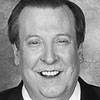
Jay Giallombardo has achieved excellence as a musician, arranger, composer, director, educator, coach, and judge. At age 15, he joined the North Shore Chapter in the Chicago area and immediately showed proficiency in arranging and tag singing, starting a barbershop club in his high school. In 1968 he helped form the quartet Grandma’s Boys, which sang together for seventeen years and won the gold medal in 1979. Jay went on to achieve high recognition as a coach, working with quartets and choruses at all levels, including championship groups in both BHS and SAI. He served as a faculty member at Harmony College and became the first District Music Educator for the ILL District, later serving the district as VP of Chorus Director Development. In 1981 he turned his attention to directing, forming the New Tradition Chorus. Buoyed by Jay’s musical leadership the chorus rose quickly and won an unprecedented 19 consecutive medals starting in 1988, including one gold. For many years Jay has directed the annual show of the AIC Chorus, the showcase of many of his epic compositions and arrangements, including “Anthems/Ode,” “A Tribute To World Peace,” and “All Nations Rise.” In 1993 Jay was certified in the Music Category which, along with the entire barbershop community, has been profoundly influenced by his wisdom and insight into the barbershop style. We are proud to honor Jay by inducting him into the Hall of Fame.
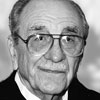
Rudy Hart* (1914-2005) was a fine composer, arranger, pianist, vocal coach, chorus director and teacher. During WWII he served in the army and was stationed near Liverpool, England. There he often entertained the troops by playing the piano and leading sing-alongs.
In June of 1956, Rudy directed The Ambassadors of Harmony Chorus of Michigan City, Indiana to an international championship. He also founded and directed The Hartsmen, a 20-voice all-male a cappella chorus that traveled throughout the United States and Canada and performed in England during a two-week tour. It was Hart who, in 1961, conceived and initiated the first Harmony Education Program. This was begun as a single, one-weekend school per year. That program grew and has become today’s annual Harmony University where hundreds of barbershoppers, both men and women, hone their skills and learn barbershop craft.
Joe Schmitt of the famous 1951 international champion quartet, The Schmitt Brothers, described Rudy Hart, who became their coach and arranger, as “the man whose friendship most influenced the quartet and gave their singing the ‘soul’ that gave their voices warmth.”
Rudy had a gift for making music come alive and inspiring performers to give their very best.

Lou Laurel* Administrator, quartet man, coach, judge, Society president, record-setting chorus director and 50-year barbershopper whose accomplishments and personable leadership made him a legend in two BHS districts: Louis (Lou) Laurel.
Lou was the first man to direct two different choruses to gold medals: the El Paso, Texas, Border Chorders in 1964 and the Phoenix Saguaro Chapter Phoenicians in 1972 – then again in 1976 and 1983.
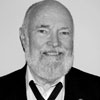
Dr. Drayton Justus embraced the four part harmony “way of life” over 50 years ago, and has continually excelled musically and administratively. To date, he is only the second man to have both won quartet gold (Gentlemen’s Agreement, 1971) and served as Society President (2006). During his presidency, Nashville, Tennessee was selected as the new permanent site of Society headquarters. His quartet entertained our troops in Vietnam and sang for the United Nations General Assembly.
Drayton has won quartet championships in four districts and as lead singer. Throughout the 1980s, he sang lead with the 1961 champions, the Suntones. He has held numerous Society/district/chapter offices, chaired committees, taught classes, coached, directed, MC’d and arranged. He received both chapter and district BOTY awards and is a member of Dixie District’s Hall of Fame.
A retired university official, Dr. Justus holds degrees in music, human resource management and education. He and his “Sweet Adeline” Sue Ann reside near their children in northern Georgia.
2011
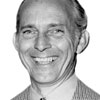
Earl Moon* (1928-1996) was a junior in high school in Kansas City, Missouri when a Barbershopper, Joe Stern, introduced him to barbershop. Earl joined the Society in 1945. Later that year he joined the Navy and ended up in Long Beach, California in 1949. There he met and married Millye. In 1950 they welcomed their daughter, Melanye.
It was in the Far Western District where he developed and honed his skills as one of the greatest Barbershoppers ever. Over a period of years he sang with the Long Beach, Santa Monica and San Fernando choruses and directed the Downey Chorus to a third-place medalist position at the 1961 international convention in Philadelphia.
From 1970 and for the next 25 years he directed the Whittier Choralaires and taught tag singing and woodshedding at Harmony College. During all those years he sang baritone in many quartets including the Far Westerners, who placed in the top ten at international for all ten years of competing.
Earl was one of the most outstanding teachers the Society has ever known. He was a prolific arranger, master barbershop craftsman and coach. When he passed away in March of 1996, the outpouring of love and admiration from fellow Barbershoppers was incredible to behold.
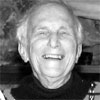
Jerry Orloff* For more than four decades, Jerry Orloff has been a major creative spirit behind some of the Society’s most effective and lasting programs in membership recruitment and in showcasing the best in barbershopping throughout the world. Largely to his credit, Auditions for Admission, the World Harmony Jamboree, the World HarmonyExchange, and Sing With the Champs are efforts that have made an immeasurable positive impact upon both our existing membership and the viewing public. Jerry epitomizes the “Man of Note,” having sponsored over 200 men into Society membership--a record unequaled.
Jerry and wife Kim have organized and/or participated in numerous performing and teaching tours including such destinations as Mexico, China, Australia, New Zealand, Ireland and Russia. He is also one of the founders of the Mixed Harmony Barbershop Quartet Association providing assistance and support for those who wish to sing in a mixed gender mode (often with a spouse). This man’s sharing of the joy of our art form has spanned the globe and resulted in his singing barbershop harmony in Chinese, Maori, and Russian! He remains active in his local chapter in Northern California and heavily involved in introducing and propagating barbershop music in the community high schools. Jerry Orloff is unquestionably one of our giants of preservation and encouragement.
2010

Willis Diekema* was an extremely accomplished composer, an ensemble music arranger and dedicated much of his life and talent to the Barbershop Harmony Society. He was one of the first to commit arrangements to paper so others could sing and enjoy them. He donated his original manuscripts and compositions to the Heritage Hall Museum, was a strong contributor to the Society’s early publications including old songs collections, was a chairman of the Society’s College of Arrangers, wrote music for at least three University of Michigan college operas while he was a student, graduated from that university where his studies included voice, harmony, counterpoint and composition, served as a member of the Society Board from 1947 to 1950, assisted in the formation of many Michigan Chapters, was a charter member of the Holland, MI Chapter, served on countless early HEP faculties, served as US ambassador to the Netherlands and was the recipient of the Distinguished Service Cross.
Above all, he was a “pioneer” Society composer and arranger of barbershop a cappella music including the Society’s theme song, Keep America Singing, and scores of songs that bestow a rich heritage which we all share to this day.
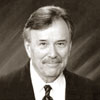
Darryl Flinn, barbershop harmony aficionado, began his barbershop journey in a high school quartet and has been singing in quartets ever since, earning a gold medal with Harmony, 2001 senior champion, and is presently singing with the 2010 senior medalist quartet Lightly Seasoned. Darryl has served the barbershop world throughout his barbershop life as an exceptional chorus and quartet coach, and exemplary director of Society and Sweet Adeline choruses, taking them into international competition. Since 1973 he has been serving in the Contest and Judging program, first as a Harmony Accuracy judge, then as a Sound judge, Sound Category Specialist, Chairman of Judges for contests, and presently as a judge in the Singing category. As if the music were not enough, Darryl has been an extraordinary administrative leader. A list of functions would include: JAD president 1979-80, Society board member 1981-82, Society board member at large 1983-84, Society Executive Committee 1984, Harmony Foundation Treasurer 1986, Society’s International President 1987, and Society’s Executive Director 1996-2004. Between all of these activities, Darryl has found time to serve on many committees, special projects, blue ribbon study groups, planning and strategy think-tanks, etc. Many honors have come from chapters, districts, and now the highest of honors . . . the Society Hall of Fame.
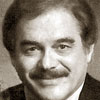
Mac Huff* graduated from the Indiana State University with a degree in choral music. He joined the Society in 1955 in Evansville, Indiana, and served as chapter chorus director for 14 years, leading them to district championships and international contests. Mac was also a quartet man, most notably with the “Funtastic Four” and the “Sound Association.” He was a prolific composer and arranger, arrangement category judge, technician, and “tag master.” In 1974 he and three other Society staff people created the musical presentation “Salute to America,” recognized by the American Revolution Bicentennial Administration for excellence during the 1976 Bicentennial Celebration.
Mac was passionate about barbershop harmony. He coached quartets and choruses that became well-known and successful, for which he never charged a fee. His personal goal, as he conducted workshops and clinics across the US and Canada, was to help “Joe Barbershopper” sing his best and enjoy the hobby to the fullest. Mac’s happiest moments were when someone heard his first overtone or locked his first chord. He was a Society staff member from 1969-1980 and wrote many of the manuals pertaining to vocal techniques and sound production. His research and teachings were instrumental to the evolution of our craft as we know it today.

Lyle Pilcher*, A newspaper owner/publisher in Illinois and Indiana, Lyle Pilcher sang on radio as a youth and did the country fair circuit with barbershop quartets. He became an arranger of some stature, but in the mid- fifties really found his niche as master coach. During the following three decades, many quartets and choruses had the pleasure of knowing him as an arranger, coach and friend. Among his many prize-winning quartets were four international champions, six other international medalists, and numerous district champions. He coached choruses to international prominence. Moreover, his influence upon the public’s appreciation of barbershop artistry was evident in similar coaching successes with Sweet Adelines, Inc., including six international champion quartets.
Arguably, he coached more barbershop medalists and champions than anyone else in the history of our Society. Pilcher was a master of interpretation who focused primarily upon “telling the story” as opposed to chord worship. In addition, he had a special knack for building upon the strengths of different groups and featuring their differences while enhancing the best artistry of which they were capable. Many consider him the major contributor in the sixties and seventies toward a new level of musicianship and interpretive quality in the barbershop art form.
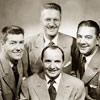
Mid-States Four : Bob Mack, Marty Mendro, Forry Haynes and Art Gracey The Mid-States Four, International Champions in 1949, are still thought by many in our Society to be the most entertaining quartet that ever won the gold medal. Their stage act was sometimes poignant, usually hilariously funny and always entertaining. The only champions ever to have won their crown and then go on to sing not only the very best treatments of songs in the a cappella style, but also use musical instruments to capture and thrill audiences around the world. They performed in all but three states, Canada, Japan and in 1952, toured in Korea, entertaining more than 50,000 UN troops. Their vocal arrangements were musically unique, featuring four part harmony based in the barbershop style but often with a melody note placed in a voice part other than the lead and chords that were sometimes changed to suit their style. Their “new sound” and their bigger than life personalities were just an exaggeration of how they really were.
Our art form was changed. We were all changed by the impact of this innovative and talented quartet.
2009

Gene Cokeroft*
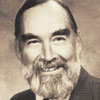
Hugh Ingraham*
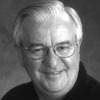
Roger Lewis
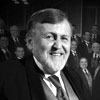
Richard Mathey
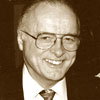
Jim Richards*
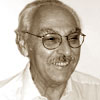
Burt Szabo
2008
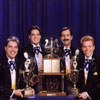
The Gas House Gang
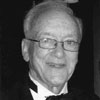
George L. Shields
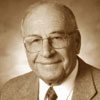
Dan Waselchuk*
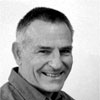
David Wright
2007
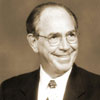
Larry Ajer*

The Confederates Quartet
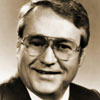
Joe Liles
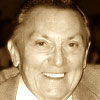
Lloyd Steinkamp*
2006
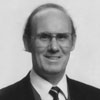
Don Amos*
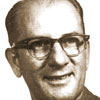
S. K. Grundy*
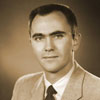
Warren “Buzz” Haeger*
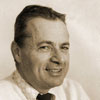
Walter Latzko*
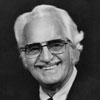
Marty Mendro*
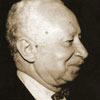
Lou Perry*

Hal Staab*
2005

Jim Clancy

Joe Stern*
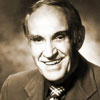
Dave Stevens*
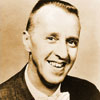
Dr. Robert D. Johnson*
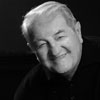
Jim Miller*
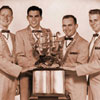
The Suntones Quartet

Ed Waesche*
2004
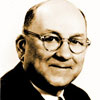
Carroll Adams*
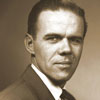
Dr. Harold “Bud” Arburg
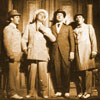
The Buffalo Bills Quartet
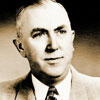
O. C. Cash*

Floyd Connett*
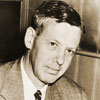
Phil Embury*<
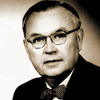
Rupert Hall*
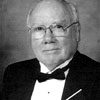
Val Hicks*
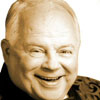
Freddie King*
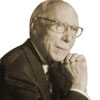
C.T. “Deac” Martin*
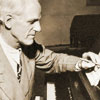
Geoffrey O’Hara*
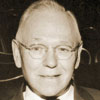
Maurice “Molly” Regan*
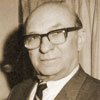
Dean Atlee Snyder*
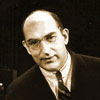
Dr. Sigmund Spaeth*
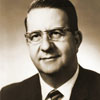
Wilbur Sparks*
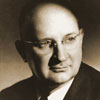
Frank Thorne*
Lifetime Achievement for Arrangers
Awarded to an arranger, living or posthumously, in recognition of the profound effect of their contributions on the musical culture of barbershop harmony as an art form through their collective body of work.
Inaugural Class of Inductees 2020
Renee Craig
Aaron Dale
Tom Gentry
Jay Giallombardo
Don Gray
S.K. Grundy
David Harrington
Val Hicks
Clay Hine
Walter Latzko
Earl Moon
Lou Perry
Sigmund Spaeth
Dave Stevens
Burt Szabo
Greg Volk
Ed Waesche
David Wright
Larry Wright
JOE LILES LIFETIME ACHIEVEMENT AWARD
The Joe Liles Lifetime Achievement Award was created as a way to honor those who demonstrated lifelong commitment to the Barbershop style, raised the standards of excellence, and have, through their leadership, helped us move forward.
View recipents
Joe Cerutti, 2024
Clay Hine, 2023
Charlotte Murray, 2022
Greg Clancy, 2020
Steve Armstrong, 2019
Lloyd Steinkamp, 2018
Earl Moon, 2017
David Wright, 2016
Mel Knight, 2015
Jay Giallombardo, Dave Stevens , 2014
Tom Gentil, Mark Hale, 2012
Ray Danley, 2011
Greg Lyne, Paul Tamblyn, 2010
R.D. Mathey, 2009
Jim Bagby, 2008
Jim Massey, 2007
Fred King, 2006
Jim Clancy, Jim Miller, Joe Liles, 2005
Dave LaBar Emcee Award Recipients
The Dave LaBar Emcee award, named for one of our departed Society giants, honors an individual who embodies greatness in the “Art of the Emcee.” The Dave LaBar Emcee award is awarded to an individual who:
- Has achieved outstanding success at the chapter, district, and international levels as an emcee.
- Understands how to communicate with the audience as both a presenter and an entertainer when appropriate.
- Has always used material that is suitable for barbershop audiences of all ages.
- Is always prepared and is very comfortable when addressing the audience by developing an excellent rapport.
View Recipients
Past Recipients Include:
Jack Smith, Bob Morrissey (posthumously), 2019
Tim Stivers, Terry Clarke (posthumously), 2018
Ray Henders, Hugh Ingraham 2017
Bob Cearnal, Freddie King 2015
Dan Henry Bowser, Lloyd Steinkamp (posthumously) 2014
Mike Maino 2013
Judd Orff 2012
Ev Nau 2011
Keith Hopkins 2010
J. Carl Hancuff 2009
Doran McTaggart 2008
Terry Aramian 2007
Celebrities in Barbershop
Through the years, more than 250,000 people have been accepted for membership in our Society, from all walks of life. Some of these people have been “celebrities” and well known public figures in the fields of politics, sports and entertainment.
While most have been card carrying members, some have been associated with the Society as celebrity supporters, and some have been named as Honorary Members* of the Barbershop Harmony Society.
View Celebrities
John Ashcroft (1942 – present) Senator (R-MO) Attorney General / The Singing Senators
Art Baker (1898 – 1966) Radio and television personality, actor
Ned Beatty (1937 – 2021)* Academy Award nominated Actor / Network
Irving Berlin (1888 – 1989)* Composer of “God Bless America”, “White Christmas”
Victor Borge (1909 – 2000)* Pianist, comedian
The Buffalo Bills – Famous quartet from The Music Man on Broadway and film, 1950 international quartet champion
The Chordettes (1946) American female popular singing quartet, best known for their hit songs "Mr. Sandman" and "Lollipop"
Bobby Bragan (1917 – 2010) Professional baseball player/manager/Phillies/Braves
Greg Buttle (1954 – present) Professional football player – NY Jets, Linebacker
Mike Conaway (1948 – present) U.S. Congressman (R-TX) The Singing Senators
Bing Crosby (1903 – 1977) Singer, actor, Barbershop Harmony Society board member
Bob Flanigan (1926 – present)* Member, The Four Freshmen
William Frawley (1887 – 1966) Song & Dance man / Actor – I Love Lucy (Fred Mertz)
Bill Gaither (1936 – present)* Gospel Singer / Producer / Grammy and Dove award winner
Arthur Godfrey* (1903 – 1983) Radio and television personality
James Gregory (1911 – 2002) Actor – TV & Film – Captain Luger on Barney Miller
Ferde Grofé (1892 – 1972) Composer of classical music; “Grand Canyon Suite”
Bill Hanna (1910 – 2001)* Creator of The Flintstones, many other television cartoon series
Lynn Hauldren (1922 – 2011) TV / Empire Carpet pitchman
Tom Henrich (1913 – 2009) Professional baseball player Yankees RF
Burl Ives (1909 – 1995) Folk singer, actor, Oscar winner
Jim Jeffords (1934 – present) Senator (R/I – VT) The Singing Senators
Jim Jordan (1896 – 1988) Star of “Fibber McGee and Molly” radio series
The King’s Men – Professional quartet, regulars on “Fibber McGee and Molly”
Bob Lally (1934 – present) TV director, The Jeffersons / Mary Hartman, Mary Hartman
Chester Lauck (1902 – 1980) Lum of “Lum ‘n’ Abner” radio series
Gordon Lightfoot (1938 – present)* Pop singer, composer “If You Could Read my Mind, Love”, “Sundown”, “Wreck of the Edmund Fitzgerald”
Trent Lott (1941 – present) Senator (D-MS) / The Singing Senators
Groucho Marx (1890 – 1977) Actor, comedian, host of “You Bet Your Life”
James Melton (1904 – 1961) Opera singer
George Mikan Jr. (1924 – 2005) NBA superstar – Minneapolis Lakers (6′ 10″)
Miles Middough (1922-2009) Production manager Little House on the Prairie
Mitch Miller (1911 – 2010)* Orchestra leader, host “Sing Along with Mitch” TV show
Sherrill Milnes (1935 – present)* Opera singer
John Miller (1950 – present) Executive vice-president, NBC television network
Burt Mustin (1884 – 1977) Actor – television and film
Pat O’Brien (1899-1983) Actor Angels with Dirty Faces / Ragtime
The Osmond Brothers* Preteen quartet, later pop music stars
Jerold Ottley (1934 – present)* Former music director Mormon Tabernacle Choir
Jim Pike (1938 – present)* Member, The Lettermen
Gene Puerling (1929 – 2008)* Singer and Arranger / The Hi-Los and Singers Unlimited
Mike Rowe (1962 – present) Dirty Jobs TV show / Spokesman Ford Motors
William Sessions (1930 – present) Director, Federal Bureau of Investigations
Micah Sloat (1981 – present) Actor – lead role, Paranormal Activity 1 & 2
Alfred E. Smith (1873 – 1944) Governor of New York
Sigmund Spaeth (1885 – 1965) Music critic, “The Tune Detective”
The Sportsmen – Professional quartet, regulars on Jack Benny radio series
Harry S. Truman (1884 – 1972) 33rd President of the United States
Dick Van Dyke (1925 – present)* Television and film actor, singer
Fred Waring (1900 – 1984)* Choral conductor, leader of the Pennsylvanians
Rudy Wissler (1928-2007) Actor / Singing voice of Scotty Beckett in The Jolson Story
Meredith Willson (1902 – 1984)* Author and composer of The Music Man
Neyla Pekarek (b. 1986) Cellist, vocalist, and pianist, and member of the folk rock band The Lumineers from 2010 to 2018
Lourde (b. 1996) New Zealand singer, songwriter, and record producer
Past Society Presidents
Since 1938 , these leaders have guided the growth and development of the Barbershop Harmony Society.
View the full list
John Santora, 2023-2024
John Donehower, 2021-2022
Dick Powell, 2019-2020
Skipp Kropp, 2017-2018
Don Fuson, 2015-2016
Shannon Elswick, 2013-2014
Alan Lamson, 2011-2012
Bill Biffle, 2009-2010
Noah Funderburg, 2007-2008
Drayton Justus, 2006
Rob Hopkins, 2004-2005
Roger Lewis, 2002-2003
Chuck Watson, 2000-2001
Ed Waesche, 1998-1999
Tim Hanrahan, 1996-1997
Dick Shaw, 1995
Ernie Nickoson, 1993-1994
Terry Aramian, 1992
Bob Cearnal, 1991
Charlie McCann, 1990
Jim Richards, 1989
Jim Warner, 1988
Darryl Flinn, 1987
Bill Parks, 1986
Gil Lefholz, 1985-1986
John Gillespie, 1984
Hank Vomacka, 1983
Merritt Auman, 1982
Burt Huish, 1981
Les Hesketh, 1980
Ernie Hills, 1979
Roger Thomas, 1978
Sam Aramian, 1977
Plummer Collins, 1976
Richard Ellenberger, 1975
Leon Avakian, 1974
Charles Abernathy, 1973
Richard DeMontmollin, 1972
Ralph Ribble, 1971
Wilbur Sparks, 1970
Bob Gall, 1969
Wesley Meier, 1968
James Steedman, 1967
Reedie Wright, 1966
Albert L. Smith, 1965
Dan Waselchuck, 1964
S. Wayne Foor, 1963
Lou Laurel, 1962
John Cullen, 1961
Clarence Jalving, 1959 – 1960
Joe Lewis, 1957 – 1958
Rowland Davis, 1956
Arthur Merrill, 1955
Berney Simner, 1954
Johnny Means, 1953
Ed Smith, 1952
Jim Knipe, 1951
Jerry Beeler, 1950
O.H. “King” Cole, 1948 – 1949
Charlie Merrill, 1947
Frank Thorne, 1946
Phil Embury, 1944 -1945
Hal Staab, 1942 – 1943
Carroll Adams, 1941
Norm Rathert, 1940
Rupert Hall, 1939
